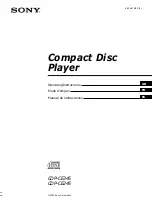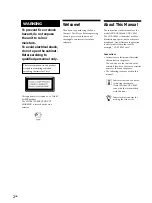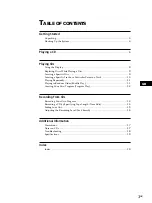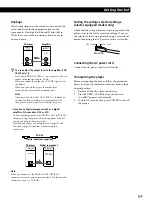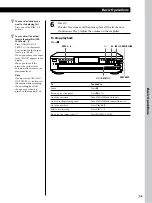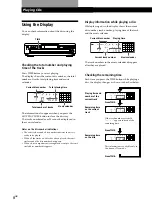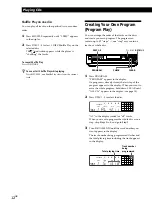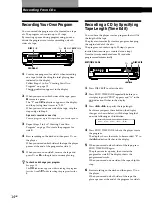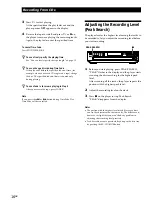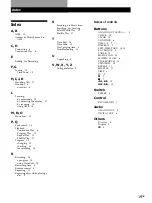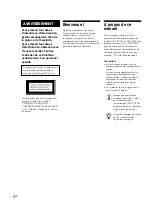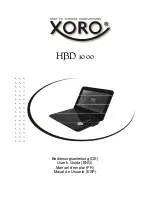
Getting Started
Getting Started
5
GB
Hookups
When connecting an audio cord, be sure to match the
color-coded cord to the appropriate jacks on the
components: Red (right) to Red and White (left) to
White. Be sure to make connections firmly to avoid
hum and noise.
Amplifier
CD player
z
You can adjust the output level to the amplifier (CDP-
CE345 only)
Z
Press ANALOG OUT LEVEL +/– on the remote. You can
reduce the output level up to –20 dB.
When you reduce the output level, “FADE” appears in
the display.
When you turn off the player, the output level
automatically returns to the maximum level.
Note
If you press the ANALOG OUT LEVEL +/– buttons on
the remote while recording, the recording level will
change even when it is preset on the tape deck, etc.
• If you have a digital component such as a digital
amplifier, D/A converter, DAT or MD
Connect the component via the DIGITAL OUT (OPTICAL)
connector using the optical cable (not supplied). Take off
the cap and plug in the optical cable.
Note that you cannot use fading in or out (page 15) and
Time Fade (page 15) functions when making this
connection.
Connecting the AC power cord
Connect the AC power cord to a wall outlet.
Transporting the player
Before transporting the player, follow the procedure
below to return the internal mechanisms back to their
original position.
1
Remove all the discs from the disc tray.
2
Press
A
OPEN/CLOSE to close the disc tray.
“no dISC” appears in the display.
3
Wait for 10 seconds, then press POWER to turn off
the player.
POC-15
Optical cable (not supplied)
Note
When you connect via the DIGITAL OUT (OPTICAL)
connector, noise may occur when you play CD software other
than music, such as a CD-ROM.
Digital component
CD player
Setting the voltage selector (voltage
selector equipped models only)
Check that the voltage selector on the rear panel of the
player is set to the local power line voltage. If not, set
the selector to the correct position using a screwdriver
before connecting the AC power cord to a wall outlet.
INPUT
CD
L
R
L
R
ANALOG
OUT
DIGITAL
OUT
OPTICAL
DIGITAL
INPUT
OPTICAL
110 - 120 V
220 - 240 V

